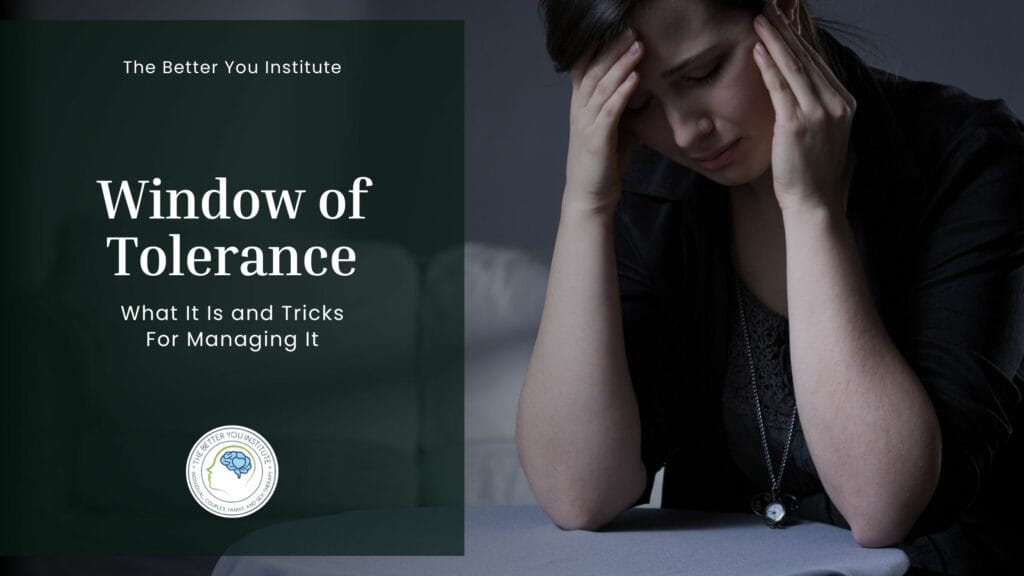Table of Contents
What Is Sexism?

The definition of sexism is “prejudice, stereotyping, or discrimination, typically against women, based on sex.
” Have you ever heard “you throw like a girl!” used as an insult? Do you know that for every dollar a man makes, a woman only makes 82 cents? Have you ever been referred to as “guys” in a group of females? Has a man ever “mansplained” to you? This gives the subtle message that we live in a “man’s world,” hinting that females are somehow inferior or not as capable.
Female Stereotypes
In society (worldwide), the “ideal” female archetype is often neat, organized, frail, friendly, motherly, accommodating, and passive. If you identify as female, does this “idealized” version describe you? It does not describe all females. If a woman cannot fulfill these roles, she can be vulnerable to being ostracized, witch-hunted, and scapegoated. These expectations are sexist and can have adverse effects on a woman’s mental health. Therefore, learning how to cope with sexism is essential. One can experience sexism anywhere: in media, at work, at home, in public spaces, etc. The effects of sexism on your mental health should not be ignored, and this article can serve as a guide to help you cope with sexism.
For women who struggle with organization, such as females with ADHD, living up to society’s expectation that women are responsible for a clean, organized household is challenging. Suppose you’re a female who doesn’t enjoy/excel at baking pies, organizing sock drawers, hosting, or managing your household calendar. In that case, you have most likely experienced some evil eyes from the women who do and from the men who want you to. Or, maybe you do enjoy these things, but you also want to make time to be a badass at work, make a name for yourself in the political scene, or speak up in groups of men. Not fitting into the norm is challenging, and it can take extra work to value yourself if the social norms of being a passive, docile woman have been ingrained in you. This is where introspection and self-care can help one cope with sexism.
How to Cope with Sexism
Sexism can happen quickly and unexpectedly, leaving women frozen in their tracks, angry, hurt, demoralized, or shut down. For instance, women commonly encounter sexism throughout their day. They are told to “smile” as they walk to work, are catcalled, are passed over for something they are more capable of doing than the person who was chosen, they are treated differently by medical providers (even the research for female-oriented disorders is biased toward men), the expectation of taking on the role of primary childcare while your male partner climbs the corporate ladder (during the Covid-19 pandemic women lost their jobs or had to quit due to childcare issues at higher rates than men and even more so for women in minority groups), and so much more daily.
It is difficult to shrug off a stranger telling you how to contort your body (e.g., smiling) because it makes them happy with no regard for your comfort level. To have to endure an explanation from someone who is doing it worse than how you would do is excruciating and a waste of time. So how do we “get over” this? The truth is, you don’t. These experiences weigh on us, and they can impact your mental and physical health.
To best be able to handle the weight of these sexisms, you must be at your best. Take care of your physical health. Feed yourself nutritious meals, exercise your body, stretch, and drink water. Surround yourself with people that help build you up and can share in companionship with the experiences you’ve had. Sit with yourself. Be calm. Learn to love yourself regardless of the expectations or teardowns you experience.
Reflection Exercise:
Take some time to reflect on these questions:

- Do you have strengths that aren’t stereotypically feminine?
- Can you think of examples of sexism not mentioned?
- What expectations of being female have you felt challenged on?
- How can you take care of your mental health when encountering sexism?
How Therapy Can Help with Sexism
There is a spectrum of gender expression. Not everyone fits into a box. It is important to consider gender oppression in the formation of one’s identity. Gender oppression results from gender norms that perpetuate the idea that gender is binary and that women are subordinate to men. It can be beneficial to explore overt and subtle forms of sexism you’ve encountered and how they’ve impacted you in the moment and over the years to combat the effects of sexism. In therapy, many people come in expressing social role conflicts. In a clinical setting, one might benefit from psychoeducation about sexism and how it affects mood. According to research by Sue and Sue (2015), a therapist needs to assess their own bias surrounding women and try not to assume that it would be healthier for a woman to be more submissive or relationship-oriented.
Through open dialogue and shared vulnerabilities, you can learn how to feel confident in how you choose to express your gender. You will feel permission to break out of the societal pressures you may have experienced. You may even find yourself starting to push back and set a new standard for yourself and society within your social circles. Your therapist will help you feel empowered, offer support where needed, and encouragement to take risks and step outside of the social norms. Your therapist can create space for you to think aloud about obtaining the change you seek.
How Society Disempowers Women
According to Sue and Sue (2015), women are often objectified and sexualized in society, and it can be hard to find a man that has not engaged in some form of buying of sex. Additionally, women are not typically shown exploring their sexuality and being comfortable in their bodily functions in the media. However, they are portrayed as sexual beings (e.g., outfits showcasing their breasts, being naked on film) more than men (e.g., showing their penis or even being shirtless). Women are often not portrayed as multi-dimensional beings. Usually, the message women receive is that they must be selfless sexual objects that serve men to be multi-dimensional beings. This message in the media can make a woman feel disempowered.
Here are some suggestions of how to cope with sexism when you feel disempowered:
- Watch some movies that are empowering to women. Here is a list of tips:
- Frida
- Kill Bill
- Wetlands
- Thelma and Louise
- The Joy Luck Club
- The Witch
- Kate
- Listen to music that is empowering to women. Here are suggestions:
- Lizzo
- Riot grrrl
- Bikini Kill
- Sleater-Kinney
- Beyonce/ Destiny’s Child
- Tennis
- Beautiful Chorus
- Pink
- Shania Twain
- Gloria Gaynor
- Kelly Clarkson
- Gwen Stafani
- Sara Berailles
- Janet Jackson
- Read empowering books for women:
- Wild by Cheryl Strayed
- The Wild Woman’s Way by Michaela Boehm
- The Ethical Slut by Dossie Easton and Janet Hardy
- 20 something, 20 everything by Christine Hessler
- Go on Sister Sing Your Song by Harryette Mullen
- The Type by Sarah K
- The Princess Saves Herself in This One by Amanda Lovelace
Educating the People in your Life About Sexism

Sexism is everywhere, and it can even occur within your immediate circle of friends and family. Often, it might feel too difficult to speak up to friends and family, and you might fear criticisms, defensiveness, or an argument. One way our loved ones can help fight sexism is by not perpetuating gender stereotypes. Although there are many ways to teach those around you, there are three specific ways we suggest. The first suggestion is to set boundaries/ expectations (statements like “that is not appropriate to say to me” or “I’m just as capable of lifting the box, you can ask me next time”).
Secondly, we suggest disclosing your own experience in response to what was just said or what happened (statements like “I feel invisible when I hear you saying you should hire someone to look at your car when you know I love working on cars” or “I feel voiceless when I’m speaking because you cut me off to tell me exactly what I was just about to say”).
Thirdly, educate your loved ones on why something isn’t appropriate and replacing it with something that is (statements like “the process of what just happened between us undermines my authority and perpetuates the idea that women are subordinate to men. When you cut me off in front of others, it implies that what you have to say is more important than what I have to say, and we are both equals here. Next time, it would be best if you can let me finish what I say and then fill in with what you want to say without undermining my authority”).
Stereotype Threat
One of the ways women are subliminally messaged to stay oppressed is through stereotype threat. Stereotype threat is when reminders of stereotypes about their demographic influence a person’s performance. For example, in the movie Wetlands mentioned above, the protagonist, Helen, asks her father if she can be an engineer like him. Her father at first says “sure” but then retracts this by saying, “but you’re not good at math.” The film seems to call for fathers to be more sensitive to their part in the oppression of their daughters. In this example, the stereotype is that women are not good at math. As Steele in their 1997 research mentions, “to experience stereotype threat one may not believe the stereotype nor even be worried that it is true of oneself.”
Men are increasingly expected to have a more prominent social role in familial and work relationships. Research has found that this requires emotional skills that are typically beyond what men acquire in modern upbringing. Therefore, the men in your life may need some education. When you challenge stereotypes, you most likely will encounter resistance (as it may be a challenge to their worldview, which is hard at first to reconcile). The best way to get through to someone is through remaining calm and attempting not to take the resistance personally. Try to remind yourself that people resist change because it is unfamiliar and therefore uncomfortable.
Navigating Sexist Dynamics with Loved Ones
Finding a balance between empowering the men in your life to meet you where you are outside of gender norms and not feeling like you’re their mother can be tricky. Too often, heterosexual couples get caught in a dance where the woman doesn’t feel like she’s getting her needs met emotionally and is carrying the majority of the mental load. The mental load is the mental management of the relationship or household. Examples of this might look like meal planning and assessing what is already in the fridge to know what needs to be bought at the grocery store, seeing glass in the bathroom that needs to be brought downstairs, knowing that Spot the dog needs his rabies shots and making the appointment. This can feel overwhelming and exhausting to the woman.
In the same instance, the man feels nagged and never good enough, often being brought back to his childhood when his mother would ask him to do things around the home. It can be difficult to break this dance, but leaning in with curiosity and empathy for the other’s lived experience (e.g., the woman living with societal norms that may not fit who she is and the man never being held to certain emotional expectations and carrying some of the societal biases that the woman wants to break free of) can lead to rewarding outcomes.
Suggestions on how to talk to your loved ones about sexism:
- Use I feel statements… “When I interact with your mother I feel anxious. I perceive her responses as shorter than usual when we discuss making pies and I don’t know how to make a pie”
- Assign them some enlightening podcasts, movies, books, etc., and then discuss them afterward.
- What did you take from them, what did your loved one take from them?
- What information do you each want to start applying to your own interactions with one another?
- How did you feel listening/watching/reading the material?
- What are you struggling with from the material?
- What could you relate to from the material?
- Was there anything you knew and have been trying to apply already?
- Give examples of sexism you have experienced to give your loved one insights
- Try not to illicit defensiveness with blaming, name-calling, or an irritable tone because this will not help someone be open to hearing your point. Instead, use the “I” Statements, ask the person to lean in with compassion and curiosity, ask for a redo if something you say may have been interpreted in a way that leaves the other person feeling defensive, keep the conversation based on feelings not “facts” or who is right/wrong, set the tone for the conversation by asking the person to see you as a teammate, let them know them to know that you see good in them and will give them the benefit of the doubt.
How to Make Change
Women from all over the world experience sexism. Strength is in numbers. A great way to make a change and also to receive emotional support is to reach out to your community.
Here are some suggestions for “being the change you want to see in the world” – Gandi.
- Protest/Go to Rallies/Marches (ex. Slut walk)
- Join groups of like-minded people who are activists. Take action.
- Meet up with females that build up your confidence
- Find female role models to emulate
- Reach out and connect with female role models
- Be a female role model
- Learn to assert your worth and needs without guilt or apologies
- Write/ Share your opinion
- Dedicate time to your own personal growth
Conclusion
Challenging sexism can be exhausting but worthwhile. You might feel discouraged at times. Therapy can provide the support you may need navigating sexism you encounter. If you are interested in the support of a therapist to work through the mental health effects of sexism, we are here to help. Please contact us or give us a call at 267-495-4951.
Our Philadelphia therapists are here to help!
“Boss up and change your life. You can have it all no sacrifice”
Meet The Author:

Courtney Miller, LPC
Licensed Professional Counselor
Courtney Miller, LPC, is a Licensed Professional Counselor with a warm, empathetic approach, specializing in children, teens, and young adults, including the LGBTQ+ community. Utilizing her artistic background, she employs creative and experiential methods in therapy. Courtney focuses on overcoming mood disorders, trauma, and relational dynamics, particularly addressing C-PTSD and narcissistic wounds. She emphasizes understanding patterns and enhancing existing strengths, offering tools like mindfulness and thought reframing. With a BA in Psychology and Fine Art from SUNY New Paltz and an MA in Mental Health Counseling from CUNY Brooklyn, she has experience in family dynamics and LGBTQ+ youth support. Based in Philadelphia, Courtney enjoys crafting, travel, biking, and spending time with loved ones.
Learn more about Courtney Miller ⇒







